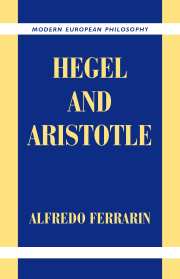Book contents
- Frontmatter
- Contents
- Acknowledgments
- List of Abbreviations
- Introduction
- PART I THE HISTORY OF PHILOSOPHY AND ITS PLACE WITHIN THE SYSTEM
- PART II LOGIC AND METAPHYSICS
- PART III ARISTOTLE AND THE REALPHILOSOPHIE
- 7 Aristotelian and Newtonian Models in Hegel's Philosophy of Nature
- 8 Aristotle's De anima and Hegel's Philosophy of Subjective Spirit
- 9 The Political Realization of Ethics
- PART IV CONCLUSIONS
- Bibliography
- Index
7 - Aristotelian and Newtonian Models in Hegel's Philosophy of Nature
Published online by Cambridge University Press: 22 October 2009
- Frontmatter
- Contents
- Acknowledgments
- List of Abbreviations
- Introduction
- PART I THE HISTORY OF PHILOSOPHY AND ITS PLACE WITHIN THE SYSTEM
- PART II LOGIC AND METAPHYSICS
- PART III ARISTOTLE AND THE REALPHILOSOPHIE
- 7 Aristotelian and Newtonian Models in Hegel's Philosophy of Nature
- 8 Aristotle's De anima and Hegel's Philosophy of Subjective Spirit
- 9 The Political Realization of Ethics
- PART IV CONCLUSIONS
- Bibliography
- Index
Summary
Sire, je n'ai pas eu besoin de cette hypothèse.
(Laplace's reply to Napoleon's question about the role of God in his celestial mechanics.)The Philosophy of Nature: Introduction
The Philosophy of Nature has always been considered one of the most controversial and obscure parts of what is usually referred to as Hegel's system. Very often the reader is struck by the awkwardness of certain passages, or of the overall intentions of Hegel, which sometimes are quite hard to make out. And yet Hegel seems to have devoted many of his efforts to this part of the system. The Additions to the Philosophy of Nature are among the longest, most intricate, and exhaustive in the whole of the Encyclopædia. Hegel's knowledge of the contemporary accomplishments in most scientific disciplines was thorough and his discussion is quite detailed.
In the thirty years since the publication of Petry's translation of and commentary on the Philosophy of Nature, innumerable contributions to this topic have been published. The whole picture of the Philosophy of Nature has undergone a substantial change, so that it would be difficult to say today, following Croce for example, that the second part of the Encyclopædia should be entirely dismissed as misguided. Hegel cannot be approached as a late 19th-century-historicist who takes his bearings by something like the division between natural sciences and Geisteswissenschaften (human sciences) and devotes himself to the latter.
- Type
- Chapter
- Information
- Hegel and Aristotle , pp. 201 - 233Publisher: Cambridge University PressPrint publication year: 2001



